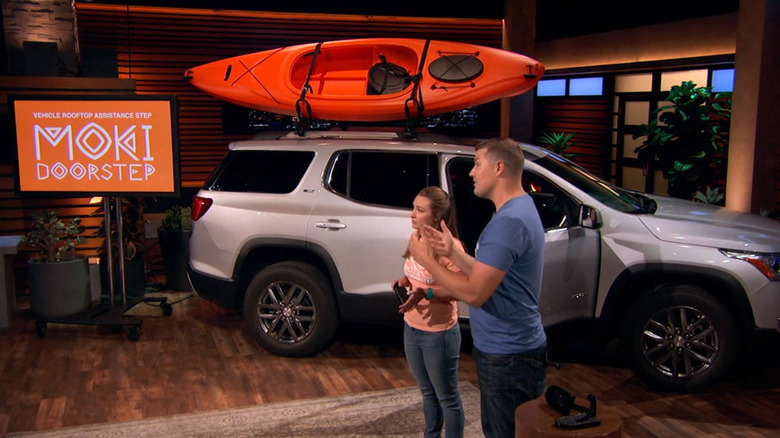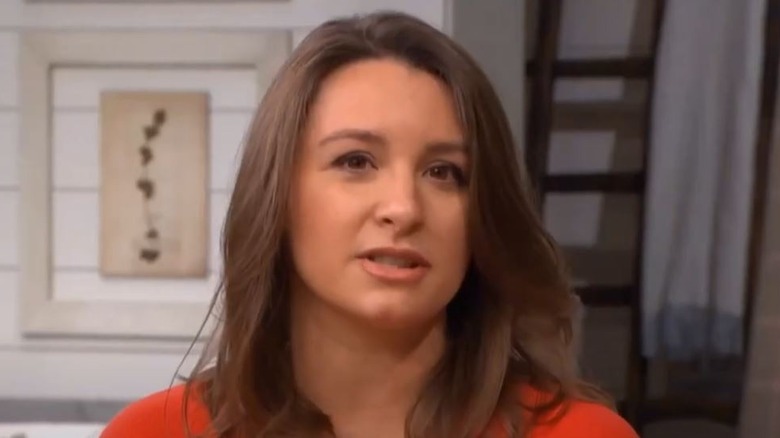Whatever Happened To Moki Door Step After Shark Tank?
The world can be a tough place for the vertically challenged. This was the dilemma for Alyssa and Zachary Brown, an outdoorsy couple who found themselves in a pickle with Alyssa's continued challenges in accessing the roof of their car to help tie their outdoor gear. They went on to create the Moki Door Step, a metal foothold that can hook to your car's internal latch and help you reach the top of your vehicle. In 2018, the couple began a Kickstarter campaign for the Moki Door Step with an original goal of $2,000 but ended up exceeding those numbers greatly, with over 2,000 backers contributing over $110,000 to the campaign.
It wasn't much longer until the couple took the biggest step in their journey up to that point by showing up on Season 10, Episode 9 of "Shark Tank." Alyssa and Zach came looking for a $150,000 investment from one of the sharks in exchange for a 5% stake in the company. Although the sharks were all impressed by the product, they acted wary once they heard of the $3 million evaluation and $44.95 price tag. Kevin O'Leary remarked that they'd be seeing knockoffs within months of officially launching. However, Daymond John decided to take a bite, offering the full $3 million for the entire company. The couple subsequently accepted John's offer, thus surpassing the price tag on some of the most expensive deals in "Shark Tank" history. But what happened with the Moki Door Step after that?
The Brown couple stepped back from the Moki Door Step business
The deal between the Browns and Daymond John actually went through before the show even hit the airwaves, and the product was licensed to the car accessory company Rightline Gear – which, incidentally, made the step's full product name Rightline Gear Moki Car Door Step. In 2021, Rightline Gear itself was acquired by outdoor products company MacNeill Pride Group, which also owns outdoor brands like ORCA and Klymit. Illustrating the product's path from the Browns' own ground-level effort to part of a much larger company's product line, the old Moki Door Step website and social media accounts went inactive or outright defunct.
On the other hand, the partnership brought big things to Moki doorstep sales in terms of availability. The product is sold by a vast number of retailers — from juggernauts like Amazon and Walmart to outdoor specialists like Klymit and REI. In addition, the original $44.95 price tag that Kevin O'Leary warned against is a thing of the past. Instead, online vendors' retail price for the product differs, and can be as low as $34.99 — quite possibly because of the production and logistical improvements brought on by MacNeill Pride Group's resources.
One thing participants should know about "Shark Tank" is to listen to the sharks' warnings, and indeed, O'Leary's other warning about the market getting potentially flooded with Moki Door Step knockoffs came true nigh-immediately. Even after "Shark Tank" and the licensing deal, Zach Brown remained heavily involved with finding and taking them down. "Most of my time is focusing on copycat and infringing products," he told Starter Story in 2020. "We have removed over 9,000. Yes, 9,000 knockoff listings off the internet. That in itself is a full-time job."
The Browns weren't looking to become full-time entrepreneurs
One thing the Browns made abundantly clear is that no matter how much potential Moki doorstep sales they had on their hands, they had no interest in becoming full-time entrepreneurs. Instead, the duo preferred to continue their main careers and familial responsibilities, and as a result of this mindset, were keen on veering away from running the company as much as possible.
"We both enjoy our jobs and working in the community," Alyssa Brown said in a 2019 interview with Pickler & Ben. "So regardless of selling the company or keeping the company, it was still something that was on our back plates and we wanted to keep our main jobs." She also cited the birth of their children as an additional reason to step back.
Because of their focus on family and their existing careers, the Browns were all too happy to license the product to take the intricacies of manufacturing and distribution out of their hands — as well as fortunate enough to be able to do this early on. "We were lucky enough that we had immediate interest from a larger company that wanted to license the product," Zach Brown told Starter Story, also confirming that the couple wasn't in a hurry to make new innovations.


